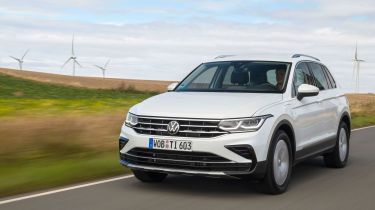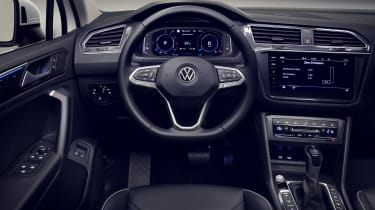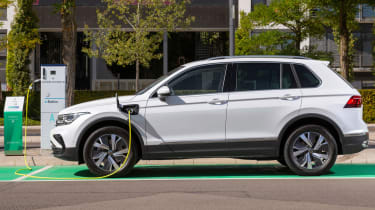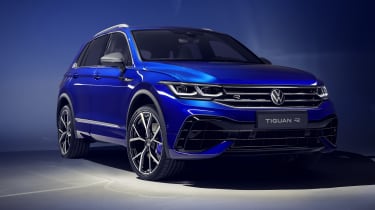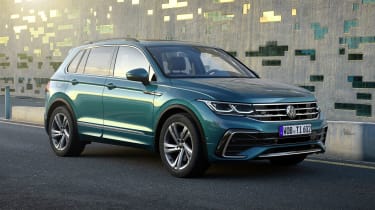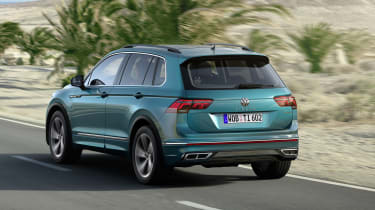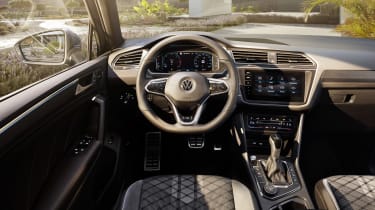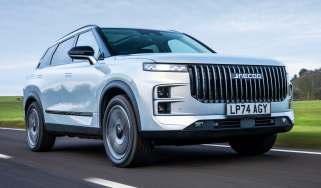Facelifted Volkswagen Tiguan: eHybrid on sale now for £35,515
New plug-in hybrid Volkswagen Tiguan emits 38g/km of CO2 and can deliver up to 177mpg
- Benefit-in-Kind rate as low as 11%
- 30 miles of electric range
- On sale from £35,515
The facelifted Volkswagen Tiguan SUV is now available as a plug-in hybrid (PHEV). Priced from £35,515, the eHybrid model makes the Tiguan much more appealing to company-car drivers and offers private buyers lower running costs and some respectable electric range.
The Tiguan eHybrid has official CO2 emissions of 38g/km, a claimed fuel economy of 176.6 mpg and is capable of 30 miles of electric running on a charge. As a result, it falls into a low Benefit-in-Kind (BiK) group, with a rate as low as 11% for the entry-level Life version.
Volkswagen Tiguan eHybrid: trims and specifications
The Tiguan eHybrid is available in three trims levels. In Life guise, which is priced from £35,515, it has LED matrix headlights, three-zone automatic climate control, adaptive cruise control, front and rear parking sensors and an eight-inch touchscreen infotainment screen with sat nav.
The mid-range Elegance, meanwhile, adds a heated steering wheel, 30-colour ambient interior lighting, an electric-powered boot with hands-free access and VW’s 10.25-inch Digital Cockpit Pro dashboard display. It also gets a rear-view parking camera, rear traffic alert and predictive cruise control.
The range-topping R-Line brings a sportier look to the Tiguan, adding a roof spoiler, front and rear bumpers, wheel arch extensions, black roof lining and 20-inch black alloy wheels.
The base Tiguan model costs £24,915. It’s about £550 cheaper than the entry-level pre-facelift car and comes with 17-inch alloy wheels, LED headlights, dusk and rain sensors and an eight-inch touchscreen with Bluetooth and DAB radio.
eHybrid powertrain and charging
The eHybrid drivetrain combines a 1.4-litre TSI petrol engine with an electric motor. The two offer a total output of 242bhp and a brisk 0-62mph time of 7.5 seconds. CO2 emissions rise from 38g/km on Life models to 43 and 41g/km on Elegance and R-Line variants respectively. Both the Life and R-Line models have a BiK rate of 11%, while it rises slightly to 13% for the Elegance trim.
The 10.4kWh battery enables the eHybrid to travel up to 30 miles on pure electric power, depending on the specification. It can take as little as three hours and 40 minutes to recharge the battery using a 3.6kW wallbox or public charger, or five hours via a normal three-pin plug.
The Tiguan eHybrid always starts journeys in all-electric E-Mode if the battery is sufficiently charged, which can be used at speeds of up to 80mph. This means that those travelling less than 30 miles in a day will rarely need to switch from electric power. The eHybrid’s powertrain can also be put in a mode to reserve electric power for use later in a journey.
Volkswagen Tiguan R
Earlier this year, the first-ever Tiguan R joined the facelifted Tiguan range with a price of £45,915. It became the flagship model, with a powerful 2.0-litre petrol engine that produces 316bhp. The fastest Tiguan is the fifth ‘R’ model in the VW lineup, after the Golf R, T-Roc R, the hybrid Touareg R and the Arteon R.
Marked out by grey mirror caps, a rear diffuser and 21-inch alloy wheels, the Tiguan R sits at the top of the range and provides a genuine performance option for the first time. It uses the same 2.0-litre petrol engine as other fast VW Group SUVs - the Cupra Ateca, Audi SQ2 and Volkswagen T-Roc R - but has 20bhp more power at 316bhp. Uprated brakes, a torque-vectoring system, a lowered dynamic chassis and a new 4MOTION all-wheel-drive system are fitted, with the latter able to portion out power to each individual wheel. Like the Cupra, a titanium Akrapovic sports exhaust is available as an option.
Accelerating from 0-62mph takes just 4.9 seconds, and the top speed is limited to 155mph. These are certainly impressive figures for a bulky family SUV, but the car’s power and size also means that you’ll probably see no more than 28mpg. Its price is about £5,000 more than the T-Roc R and £7,000 more than an entry-level Cupra Ateca.
The Tiguan R looks just as athletic on the inside, with sports seats, a flat-bottomed R-badged steering wheel and exclusive dashboard trim. You also get paddles to change gear yourself but the Tiguan sticks with a conventional gear lever rather than the Golf’s small switch.
Standard features include Matrix LED headlights, keyless entry and start, a rear-view camera, VW’s Travel Assist semi-autonomous driving function, heated front seats and a heated steering wheel.
Petrol and diesel engines
Alongside the eHybrid and R models, the Tiguan can be had with two other petrol engines. Both 187bhp and 242bhp versions of the same 2.0-litre engine come exclusively with four-wheel drive. Accelerating from 0-62mph takes 7.4 seconds and six seconds respectively, meaning a 242bhp Tiguan is actually faster than a Golf GTI. The trade-off is 32-34mpg fuel economy, depending on the spec and engine, and you’ll see a lot less than that if you drive enthusiastically. The 187bhp engine is available on Elegance (£36,275) and R-Line (£36,140) trims; the 242bhp one is only available with R-Line, at a cost of £39,560.
Lower down the range, the new Tiguan gets a 1.5-litre petrol engine, available with 128 or 148bhp. Picking the 128bhp petrol engine with a manual gearbox limits you to base and Life trims, and it’ll manage up to 44.8mpg and 0-62mph in 11 seconds. The 148bhp petrol allows you to pick an automatic gearbox, and isn’t much less economical but is a second or two quicker from 0-62mph.
The 148bhp diesel is familiar but here it’s only available with an automatic gearbox, although you can pick all-wheel drive. You can expect 48-50mpg from front-drive cars depending on trim level, and a 9.3-second 0-62mph time, while the 197bhp engine (shared with the Golf GTD) is only available on the top specs with all-wheel drive. As a result, it’s quick - 7.5 seconds to 62mph - but not particularly economical, promising up to 42mpg.
Styling
Volkswagen has redesigned the front end of the Tiguan, which now looks more similar to the latest Golf. There’s a hint of Volkswagen Touareg in the styling, too, thanks to a taller bonnet, slimmer headlights and a bigger grille. The bumpers at each end are new, and most models get an exclusive bumper design (R-Line models get bigger air intakes and four fake exhausts, for example). You’ll also spot a new tail-light design and updated badging.
Interior
Like the latest Volkswagen Golf, the Tiguan’s interior is now available with touch-sensitive panels for the climate control and steering wheel, replacing physical buttons. Volkswagen says these are optional extras but they may be fitted to some UK trim levels as standard. If they’re available at extra cost we’d recommend avoiding them; our experience in the Golf showed that they’re not as intuitive as physical buttons and are prone to noticeable fingerprint smudges.
Extra technology comes in the form of an embedded eSIM, which facilitates a range of online features through the infotainment system. Depending on spec, the new Tiguan can come with Android Auto, wireless Apple CarPlay and natural voice command recognition. A new Harman Kardon sound system, matrix LED headlights, scrolling indicators and predictive adaptive cruise control join the options list, alongside VW’s Travel Assist semi-autonomous driving tech, which combines the cruise control and the lane-keeping assist.
Read more in our Volkswagen Tiguan review, or see where it places on our list of best family SUVs.
Recommended

New Subaru Trailseeker revealed as rugged electric SUV with 375bhp

New Subaru Solterra brings more range, power and polish
Most Popular

Suzuki’s new 10-year warranty is free – here’s how to get it
Tips & advice

Car dashboard warning lights: what does each symbol mean?

Electric car charging stations: public networks, charger types, apps and maps


